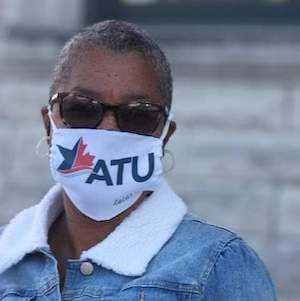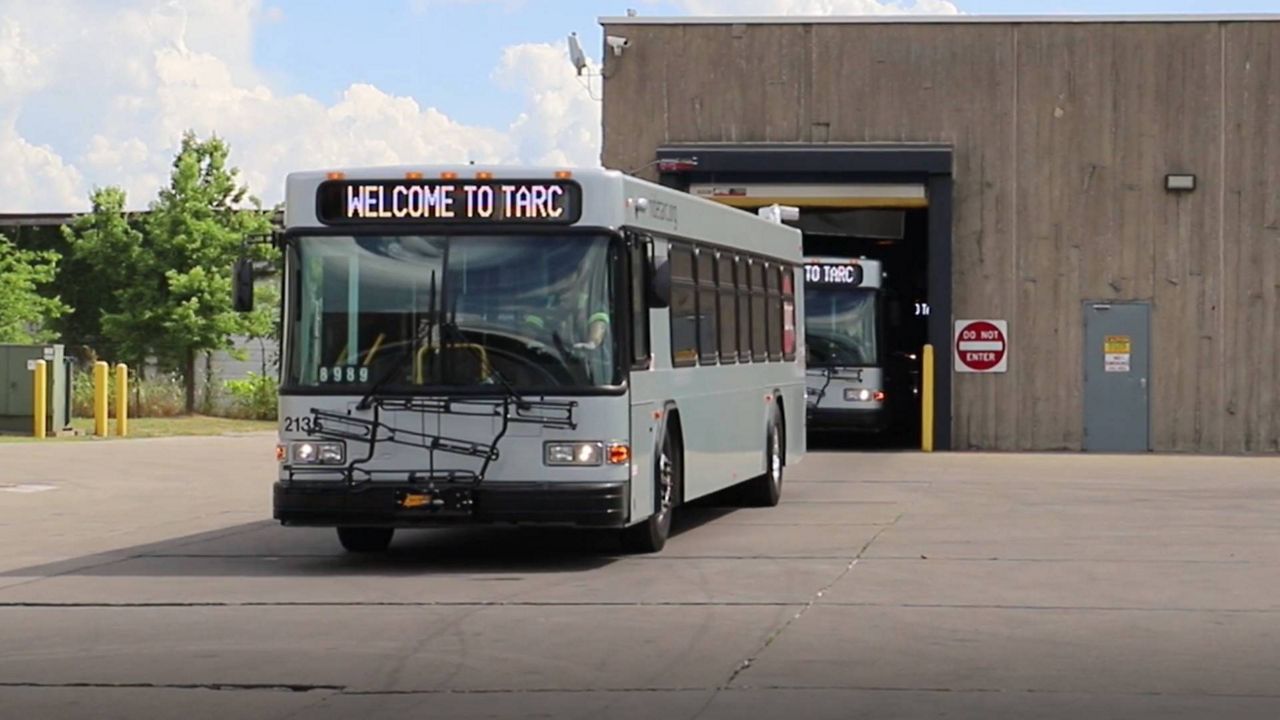LOUISVILLE, Ky. — Last spring, when the coronavirus first showed up in Louisville, Lillian Brents, who was driving a city bus at the time, sent her asthmatic daughter to live with friends who were able to quarantine at home.
“When COVID first hit, I just thought it was a death sentence for her,” Brents, a mother of five, said of her daughter. “That was hard on me, mentally and physically, because I've never been away from my kids. But I still had to pay bills.”
Last November, Brents was elected president of ATU Local 1447, the Transit Authority of River City (TARC) driver’s union. Among her first acts was to call for drivers to receive the same type of bonus — variously called hazard, essential, or “thank you” pay — that many other essential workers received early in the pandemic. And for months, she said, those calls fell on deaf ears.

Now, COVID-19 is resurgent and her appeal has taken on new urgency. "People are still putting their households, and their lives at risk," she said.
Not only is Brents asking for TARC drivers to receive essential pay and for drivers of TARC3 paratransit vehicles to get a raise, she’s calling for the removal of TARC executive director Carrie Butler.
In comments to Metro Council Thursday, Brents criticized a “lack of COVID safety measures” at TARC and “hostile leadership."
“Carrie Butler is not a good fit for TARC,” Brents told council members. “The union is making its claim that she should be replaced.”
TARC spokesperson Jenny Recktenwald defended the agency in a written statement to Spectrum News 1 this week. She emphasized that TARC continues to provide workers with PPE, regularly sanitizes buses, and adheres to “all CDC and Transportation Security Administration guidelines for passengers and workers.” As for the demand for essential pay, Recktenwald wrote that TARC leadership "will respond to this request in a timely fashion."
When the coronavirus hit the U.S., many things ground to a halt, but TARC buses kept rolling. “Whether people needed to go to the grocery store, doctor's appointments, or work — whatever the need, we were essential to essential workers,” Brents said.
TARC responded in the early days of the pandemic by providing drivers with gloves, hand-sanitizer, and cleaning wipes, while regularly disinfecting buses. It established rules for social distancing and required riders to exit at the back of the bus, reducing contact with drivers.
But, like many workplaces, TARC faced difficulty obtaining PPE and drivers reported hanging shower curtains in buses to serve as a barrier between passengers.
“We deal with the public. We’re constantly put on the line,” Brents said. “But when you talk about compensation, everyone is mute.”
By the time the pandemic entered its second month, some essential front-line workers, including Amazon and Kroger employees, began receiving hazard pay and bonuses from their employers. Several months after that, frustrated TARC drivers, some wearing T-shirts that said “TARC doesn’t care about us,” took their concerns to the steps of the agency's headquarters.
Dozens of employees gathered with signs and bullhorns to demand better PPE — some drivers accused TARC of providing meager amounts of hand sanitizer and dried out disinfectant wipes — along with essential pay.
“That's something that we've been asking for over a year now,” Brents said this week.
Recktenwald acknowledged that Brents has been calling for essential pay for months, but she said the union chief long failed to submit the request in writing. That was necessary, she wrote, because "any change to ATU members’ pay would require a modification to the collective-bargaining agreement."
Brents disagreed with both of those statements. She said written requests for essential pay were made by her successor last summer and she argued that such pay could be dispersed outside of the collective-bargaining agreement. She added, "That's not something that we should even have to ask for."
Public transit workers around the country were some of the first people to have access to COVID-19 vaccines in early 2021. In February, TARC drivers began receiving shots. Recktenwald said TARC leadership worked with the city health department “to cycle its coach operators and maintenance employees through the LouVax clinic,” which was set up at the Fairgrounds for several months earlier this year.
As vaccine uptake increased in Louisville and COVID-19 cases fell, a sense of normalcy began to return to TARC. All pre-pandemic bus routes resumed and laid off employees returned to the job, though ridership remains roughly half of what it was prior to the pandemic.
The low case numbers of the late spring and early summer provided a moment for TARC drivers to breathe and gave them the sense that the pandemic was winding down. Then, the delta variant hit. “Just when we thought we were on the backstretch. Just when we thought, ‘Hey, they got a vaccine,’ it's surging again,” Brents said.
Louisville's weekly COVID case numbers are now on par with last winter, the deadliest period of the pandemic. Brents said that’s led to an immediate concern for the safety of driver’s and their families, who have no choice but to come into daily contact with members of the public, many of whom may not have access to masks or may be unvaccinated. “Everyone's just overwhelmed,” Brents said.
But she emphasized that TARC drivers continue to get behind the wheel and continue to serve the public. “I'm just asking for TARC to take care of those who have taken care of everybody else,” she said.



